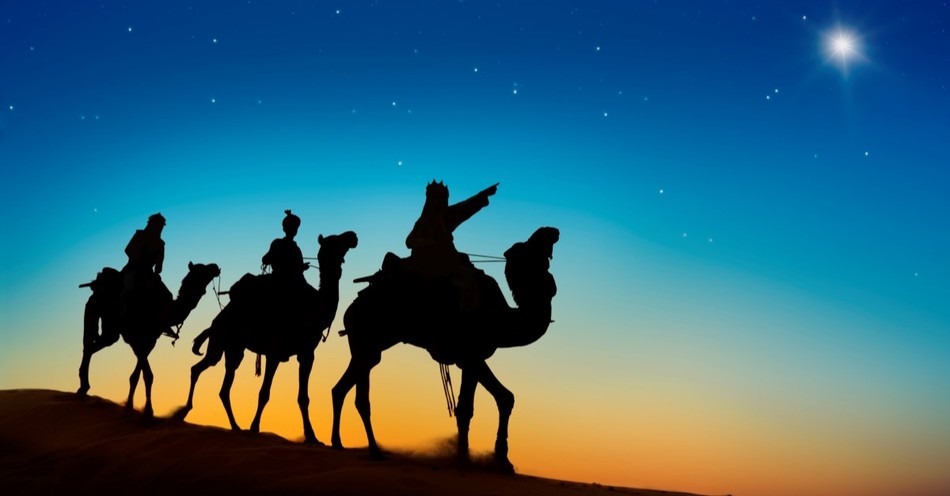"After Jesus was born in Bethlehem in Judea, during the time of King Herod, Magi from the east came to Jerusalem and asked, “Where is the one who has been born king of the Jews? We saw his star when it rose and have come to worship him.” (Matthew 2:1-2)
Who were the three Magi from the east that followed a star to find the newborn King and present gifts of adoration?
Who were the Three Wise Men?
The Three Wise Men, also known as the Magi or the Three Kings, are figures mentioned in the Bible in the Gospel of Matthew. They are said to have visited the newborn Jesus in Bethlehem, bringing gifts of gold, frankincense, and myrrh. The Bible does not specify the number of Wise Men; the idea of three Wise Men likely comes from the fact that three gifts are mentioned.
The Gospel of Matthew describes the Wise Men as following a star that led them to the location of Jesus' birth. The Bible doesn't provide detailed information about their identities, except that they were "Magi from the East." Tradition and folklore have added various details about them, such as their names (Caspar, Melchior, and Balthazar), their countries of origin, and their roles as representatives of different races or ages.
Caspar: Often depicted as a young man and sometimes as representing the continent of Europe.
Melchior: Traditionally portrayed as an older man, sometimes with a white beard, and representing Asia.
Balthazar: Frequently depicted as a middle-aged man of African descent, symbolizing Africa.
The visit of the Wise Men is an important part of the Nativity story, and their gifts are often interpreted symbolically. Gold is associated with kingship, frankincense with divinity or worship, and myrrh with the future death of Jesus. The account of the Wise Men is celebrated in Christian tradition as the feast of Epiphany on January 6th, marking the manifestation of Jesus to the Gentiles.
The Magi Visit the Messiah: Matthew 2
"After Jesus was born in Bethlehem in Judea, during the time of King Herod, Magi from the east came to Jerusalem and asked, “Where is the one who has been born king of the Jews? We saw his star when it rose and have come to worship him.”
When King Herod heard this he was disturbed, and all Jerusalem with him. When he had called together all the people’s chief priests and teachers of the law, he asked them where the Messiah was to be born. “In Bethlehem in Judea,” they replied, “for this is what the prophet has written:
“‘But you, Bethlehem, in the land of Judah, are by no means least among the rulers of Judah; for out of you will come a ruler who will shepherd my people Israel.’ ”
Then Herod called the Magi secretly and found out from them the exact time the star had appeared. He sent them to Bethlehem and said, “Go and search carefully for the child. As soon as you find him, report to me, so that I too may go and worship him.”
After they had heard the king, they went on their way, and the star they had seen when it rose went ahead of them until it stopped over the place where the child was. When they saw the star, they were overjoyed. On coming to the house, they saw the child with his mother Mary, and they bowed down and worshiped him. Then they opened their treasures and presented him with gifts of gold, frankincense and myrrh. And having been warned in a dream not to go back to Herod, they returned to their country by another route." (Matthew 2:1-12)
Bible Meaning of the Magi
Concerning the group of magi who came to find the King of the Jews, Matthew 2 says only that they arrived from the East by following "His star." According to other classical writers, the term magi meant either those who practiced magical arts (as in Acts 8:9 and Acts 13:6) or Eastern priest-sages usually associated with the area near Babylon and said to look into the mysteries of the universe through astronomy, astrology, and natural sciences. The latter makes the most sense here.
Matthew's account does not even list the number of magi, but their knowledge of the expected Messiah (Christ) should be no surprise. During this time, many Jews lived in dispersion, scattered throughout the Roman Empire and the East. With them, they carried the hope of the Messiah as promised in what we call the Old Testament. As evidence, we need look no further than Yemen, whose kings professed the Jewish faith from around 120 B.C. to the sixth century of our era.
However, their understanding of prophecy proved somewhat limited since they did not know where Christ would be born. Instead, they followed a particular "star" to Judea and then headed for Jerusalem, the capital city and the place where one might expect to find a king.
The authorities of Israel directed the magi to Bethlehem, according to the prophecy in Micah 5:2. Guided again by the star, though they likely only regarded this as confirmation of the location, the magi found and paid homage to Christ.
While some have claimed the account of the magi is nothing more than a myth designed to show how Jesus met the expectations of the Jewish Messiah, the account actually undermines this claim. The Jews of the time expected a Messiah the whole world would submit to and honor. The appearance of only a few magi seems almost a caricature of those expectations.
Adapted from The Life and Times of Jesus the Messiah by Alfred Edersheim (Book II, Chapter VIII).
What Can We Learn from the Wise Men?
It is not known who these wise men were. Their names and dwelling places are alike kept back from us. We are only told that they came "from the East."
Matthew 2:1-12 shows us that there may be true servants of God in places where we should not expect to find them. The Lord Jesus has many "hidden ones" like these wise men. The grace of God is not tied to places and families. The Holy Spirit can lead souls to Christ without the help of many outward means. Men may be born in dark places of the earth, like these wise men, and yet like them be made "wise unto salvation."
These verses teach us that it is not always those who have the most religious privileges who give Christ the most honor. We might have thought that the Scribes and Pharisees would have been the first to hasten to Bethlehem on the lightest rumor that the Savior was born. But it was not so. A few unknown strangers from a distant land were the first, except the shepherds mentioned by Luke, to rejoice at His birth.
These verses teach us that there may be knowledge of Scripture in the head, while there is no grace in the heart. Notice how King Herod sends to inquire of the priests and elders "where the Christ would be born." Notice also what a ready answer they return him and what an acquaintance with the letter of Scripture they show. But they never went to Bethlehem to seek for the coming Savior.
The conduct of the wise men described in this chapter is a splendid example of spiritual diligence. What trouble it must have cost them to travel from their homes to the place where Jesus was born! How many weary miles they must have journeyed!
It would be well for all professing Christians if they were more ready to follow the wise men's example. Where is our self-denial? What pains do we take about our souls? What diligence do we show about following Christ? What does our religion cost us? These are serious questions. They deserve serious consideration.
Last but not least, the conduct of the wise men is a striking example of faith. They believed in Christ when they had never seen Him - but that was not all. They believed in Him when the Scribes and Pharisees were unbelieving - but that, again, was not all. They believed in Him when they saw Him as a little infant on Mary's knee and worshiped Him as a king.
Adapted from The Gospel of Matthew by J.C. Ryle (Chapter 2).
Why Don't the Other Gospels Mention the Magi?
In Matthew 1:1-23, there’s an incident recorded that is entirely passed over by the other Evangelists but is peculiarly appropriate in this first Gospel. This incident is the visit of the wise men (magi) who came from the East to honor and worship the Christ Child. The details which the Holy Spirit gives us of this visit strikingly illustrate the distinctive character and scope of Matthew’s Gospel.
This chapter opens as follows, "Now when Jesus was born in Bethlehem of Judea in the days of Herod the King, behold, there came wise men from the east to Jerusalem, Saying, 'Where is He that is born King of the Jews? We have seen His star in the east and are come to worship Him.'" Notice, these wise men came not inquiring, "Where is He that is born the Savior of the world?" nor, "Where is the Word now incarnate?" but instead, "Where is He that is born King of the Jews?"
The fact that Mark, Luke, and John are entirely silent about this, and the fact that Matthew’s Gospel does record it, is surely proof positive that this first Gospel presents Christ in a distinctively Jewish relationship. The evidence for this is cumulative: there is first the peculiar expression with which Matthew opens — "the book of the generation of," which is an Old Testament expression and met with nowhere else in the New Testament; there is the first title, which is given to Christ in this Gospel — "Son of David"; there is the Royal Genealogy which immediately follows; and now there is the record of the visit of the wise men, saying, "Where is He that is born King of the Jews?"
Adapted from Why Four Gospels? 1. The Gospel of Matthew, by A.W. Pink.
Photo Credit: © Getty Images/Rawpixel









